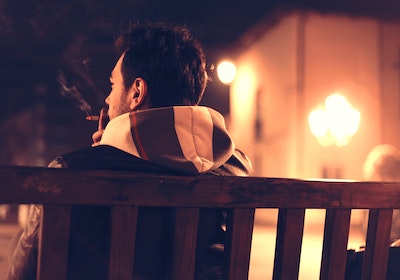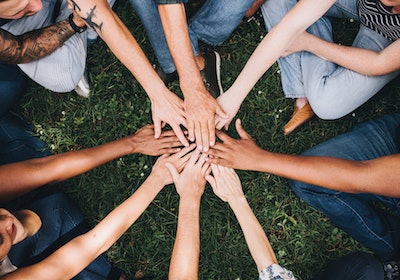Is loneliness the new smoking?
We understand that it is difficult for people to reach out and talk about being lonely. And there is a similar shame or stigma associated with loneliness as there is to smoking. But is that where the similarities end or are there more connections between the two?
From years of clinical experience as an Osteopath, (however without any scientific explanation) sometimes I get a sense how loneliness is expressing itself in the physical body. It is a silent drain, an isolated heaviness that somehow appears to leave some type of physical imprint on the tissues.
As a practitioner, it is difficult to find the words to express the sensation that I feel under my hands. It is the struggle of juggling a scientific rationale with an intuitive experience to explain how and why I get this “sense” of what is going on with someone.
Am I interpreting body language? Is it the tone, pace or some other marker in their speech? Or is it directly some specific feeling to the muscles? Other tissues of the body that is being held and potentially released during treatment?
To be honest, these are just musings and I really don’t have an answer.
Addressing loneliness is critical to the health of ourselves, or loved ones and community as a whole
But I do feel that we need to be discussing the physical, social, emotional and societal harm that is quietly taking place in our community. Finding ways to address and support people experiencing isolation or a feeling of disconnection is essential to the health of our family, friends and wider groups we associate with.
What does science say about loneliness?
 Researchers are discovering that loneliness may be as bad for our health as smoking 15 cigarettes per day and more harmful than obesity.
Researchers are discovering that loneliness may be as bad for our health as smoking 15 cigarettes per day and more harmful than obesity.
Isn’t that incredible! And frightening.
In addition, it may increase our chance of getting sick, reduce our rate of recovery once we are ill. It multiplies our chances of serious health conditions such as heart disease, alzheimer’s disease and stroke.
It’s well known that there is a direct link with depression and may lead to an early death.
Has it always been this way, or is it on the rise?
The research indicates that loneliness has doubled since the 1980’s! Younger people are experiencing it at significantly increasing rates and experiencing poorer health because of it.
Older people, especially the elderly are also high risk. With increasing age, your oldest friends, siblings and other associates are more likely to move, get sick or pass away. Younger family members are busy and maybe don’t recognise what is happening.
Why is loneliness becoming an increasing issue?
 Could it be that the rise of social media, such as facebook, that should be increasing our participation and social circles may be part of the picture?
While we connect digitally , we are reduce our time spent face to face with people we care about. We may have an insight into the lives of many more people, by following, liking or sharing. This does not equal an increasing of deep bonds, emotional connection and depth of trust.
Could it be that the rise of social media, such as facebook, that should be increasing our participation and social circles may be part of the picture?
While we connect digitally , we are reduce our time spent face to face with people we care about. We may have an insight into the lives of many more people, by following, liking or sharing. This does not equal an increasing of deep bonds, emotional connection and depth of trust.
We are less likely to directly interface with people in our own community.
It is worth asking yourself, do I know my neighbours (including their names)? Can you knock on their door and confidently ask for a cup of flour? Share a cup of tea? Would they be willing to feed the cat if I need to go away for work?
Do I wave happily when you crossing paths? Do I deliberately avoid eye contact, eliminating chit chat due to feeling time poor?
Increasing work demands, chronic sleep deprivation, not spending enough time with people you care about contribute. A lack of “me time” is also associated with increasing loneliness.
Can you be lonely and have lots of social contact?
Yes, not everyone experiencing it is socially isolated, a hermit or avoiding contact with others. It has been estimated up to half of middle aged people are experiencing some it in some form or another. People report feeling like no one understands them, not having close friends or people they trust. These feelings are signs of loneliness.
How to feel less lonely
 While it may sound like a push to start with, deliberately and consciously increasing your face to face social contact is worthwhile. Making the effort to spend time with people you love and sharing personal information and actively engaging in and listening to them are important steps in reconnecting.
While it may sound like a push to start with, deliberately and consciously increasing your face to face social contact is worthwhile. Making the effort to spend time with people you love and sharing personal information and actively engaging in and listening to them are important steps in reconnecting.
If you are new to an area, or your nearest and dearest live far away, joining community groups, sporting or hobby based activities are great options. Anything where people meet about something you are interested in is a great place to start.
Social media tends to portray the positive aspect of peoples lives and is often not a true representation of daily life. Focusing on how great other peoples lives appear online can deepen the feelings of isolation.
Self care
Focusing on getting enough exercise, getting ample sleep, spending time with friends and family and working an appropriate amount can all help to combat the issue.
Don’t be afraid to speak out
One of the great privileges of being an Osteopath is sharing and listening to some of the most intimate aspects to peoples lives. Chatting about your experiences is a way to ease the burden and lighten the load. Most people experiencing loneliness don’t have a psychological disorder. If your health is being significantly affected, we may support you to seek further assistance from the incredible health professionals within our network. Alternatively you can speak anonymously and confidentially to lifeline.

